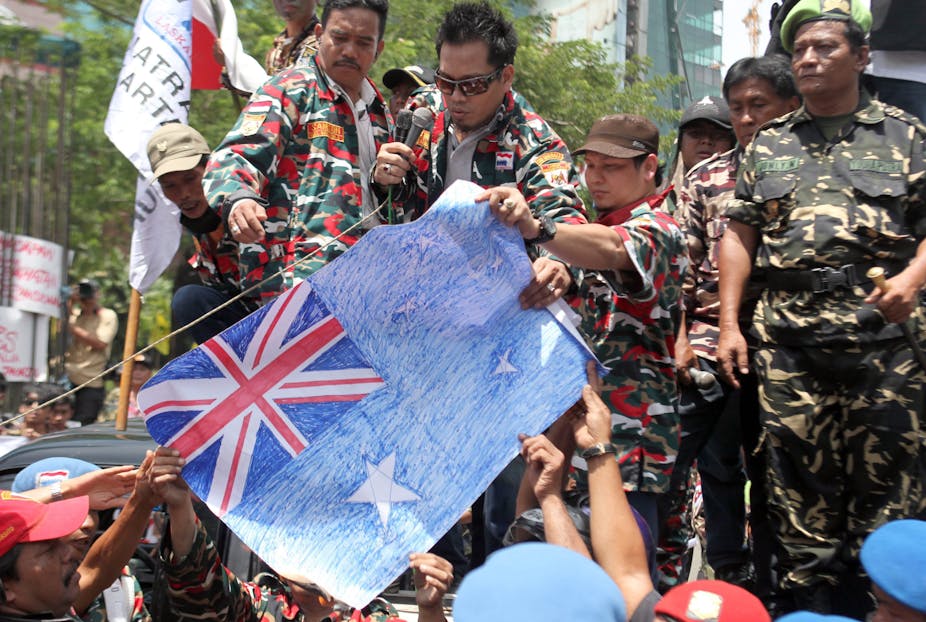According to reports, the Abbott government is considering scrapping the ABC’s Australia Network in the May budget to save money, ending its role in “soft diplomacy” efforts in the Asia-Pacific region.
The network’s future is being considered in the context of national debate over the ABC’s reportage of claims the Australian Navy abused asylum seekers and whether – as prime minister Tony Abbott has put it – the ABC was lacking “basic affection for our home team”.
What’s more, the 2011 tender process for the Australia Network was controversial. The ABC was awarded the contract despite the recommendations of two independent panels and then-foreign minister Kevin Rudd that it should have gone to Sky News, partly owned by News Corp.
Questions about the role and future of the Australia Network are not new. Julie Bishop mentioned it in an 2012 ANU lecture when shadow foreign minister, and has brought up the issue on repeated occasions since. Her main concerns, expressed as recently as Friday, are about quality of content, value for money and the promotion of Australia’s diplomatic interests in the region.
Bishop implicitly acknowledges that the debate should be about reviewing the quality and nature of the content shown on the Australia Network, not its existence. The ANU’s Ashlee Betteridge has argued cogently that an overhaul of content is necessary to promote Australia’s development priorities in a more strategic manner.
Unfortunately, the underlying focus on the ABC’s editorial independence is an irritant that skews attention from the health of Australia’s public diplomacy, and the role of international broadcasting within that.
When you think of the United Kingdom in Africa and most other places in the world, you think of the BBC. The BBC is why the United Kingdom ranks highly on the Global Soft Power Index. Similarly, when you think of the United States in eastern Europe, you think of the Voice of America.
More recently, al-Jazeera has become synonymous with Middle Eastern perspectives, especially those of its host country Qatar. These broadcasters are effective in a public diplomacy sense because they are independent while simultaneously giving people a window into the national identity and diplomatic “brand” of that nation.
What is the story we want to tell our region? As American political scientist Joseph Nye, who coined the term “soft power”, has said:
Narratives become the currency of soft power.
This is a question that Australia has neglected for some years, and we have not yet got our story right. As The Australian’s Paul Kelly opined a decade ago:
Australia’s singular recent failure lies in its inability to conceptualise its soft power as a national strategic asset.
The Lowy Institute, an Australian foreign policy thinktank, has paid considerable attention to one aspect of this failure in its series on the Diplomatic Deficit in relation to diplomatic staff and embassies. But there are multiple challenges around Australia’s narrative as to our place in the Asia-Pacific region, our values and sense of identity.
For example, by spruiking our G20 presidency in Davos with a tourism promotion featuring ubiquitous images of snorkelling, the Sydney Opera House and sunbathing, Australia missed a trick.
Abbott said he wanted the G20 to be “more than a talkfest”, and that “trade comes first”, so our narrative and visuals should have reinforced that message. Instead, we distracted world leaders with beautiful bronzed bathers - a promotion which we have tried before.
What, then, should be the role of the Australia Network? Should it exist at all? Just how important is it? Is it the right way for us to spread our message? And could the funds be spent better?
If we are asking the question as to whether a national broadcaster is pivotal to a public diplomacy strategy, then evidence would suggest yes. According to the Lowy Institute, nations that take public diplomacy seriously are increasing their investment in their international broadcasting capacity.
It should be noted that the Lowy Institute report was commissioned by the ABC, but the findings are broadly supported by wider research. The Lowy Institute found that there are two key requirements for successful public diplomacy in the broadcasting space. One is credibility and editorial independence, which Bishop has already identified. The second is long-term stable funding, and a strategic vision set by the Department of Foreign Affairs and Trade (DFAT).
The real question, then, is not if the Australia Network and Radio Australia should exist, but the form in which they should exist, and what part of the region they should focus on. Australian broadcasting in the Pacific perhaps is more crucial than in some parts of Asia.
The absence of a robust and strategic vision for Australia’s soft power projection, one that adequately incorporates e-diplomacy and international representation, is the root problem. The fact that these irritants regularly distract us suggests that our strategy is inadequate.
Decisions about the proper level of investment should fall out of that strategy. Most other nations, such as the UK, Germany, Korea and China, do find international broadcasting cost-effective when combined with social media strategies (although Canada is the exception), whilst acknowledging public diplomacy strategies are hard to evaluate.
DFAT’s current (somewhat meagre) public diplomacy strategy says that Australia’s public diplomacy mission is to:
…inform, engage and influence audiences overseas and in Australia, advocating and messaging to broaden their understanding and bring about attitudes that align with Australia’s international policy priorities.
We may need a strategic rethink of the Australia Network content, but rather than turning the pictures off, we should think about this bigger picture.

